#sixties scoop
Explore tagged Tumblr posts
Text
Song of the Day
"Call of the moose" Willy Mitchell, 1980 As you might know, September 30th is Truth and Reconciliation day (more commonly known as Orange Shirt Day), a national day in Canada dedicated to spreading awareness about the legacy of Residential schools on Indigenous people. Instead of just focusing on a song, I also wanted to briefly talk about the history of the sixties scoop and its influence on Indigenous American music and activism.
The process of Residential schooling in Canada existed well before the '60s, but the new processes of the sixties scoop began in 1951. It was a process where the provincial government had the power to take Indigenous children from their homes and communities and put them into the child welfare system. Despite the closing of residential schools, more and more children were being taken away from their families and adopted into middle-class white ones.
Even though Indigenous communities only made up a tiny portion of the total population, 40-70% of the children in these programs would be Aboriginal. In total, 20,000 children would be victims of these policies through the 60s and 70s.
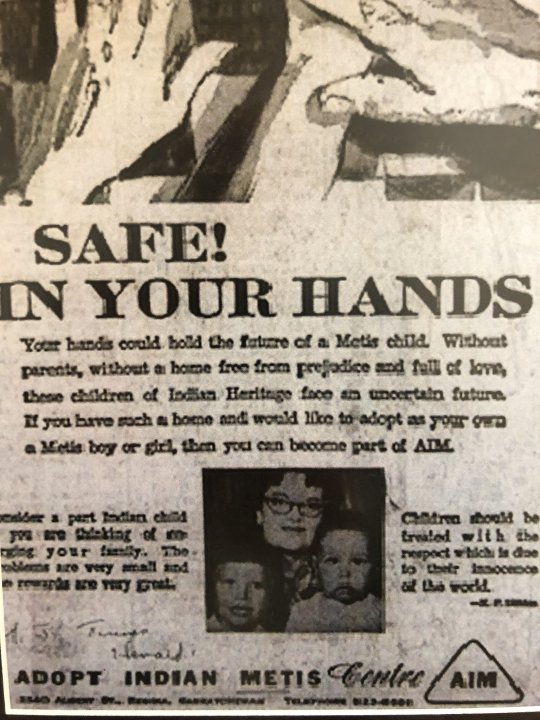
These adoptions would have disastrous effects on their victims. Not only were sexual and physical abuse common problems but the victims were forcibly stripped of their culture and taught to hate themselves. The community panel report on the sixties scoop writes:
"The homes in which our children are placed ranged from those of caring, well-intentioned individuals, to places of slave labour and physical, emotional and sexual abuse. The violent effects of the most negative of these homes are tragic for its victims. Even the best of these homes are not healthy places for our children. Anglo-Canadian foster parents are not culturally equipped to create an environment in which a positive Aboriginal self-image can develop. In many cases, our children are taught to demean those things about themselves that are Aboriginal. Meanwhile, they are expected to emulate normal child development by imitating the role model behavior of their Anglo-Canadian foster or adoptive parents."
and to this day indigenous children in Canada are still disproportionately represented in foster care. Despite being 5% of the Total Canadian population, Indigenous children make up 53.8% of all children in foster care.
I would like to say that the one good thing that came out of this gruesome and horrible practice of state-sponsored child relocation was that there was a birth of culture from protest music, but there wasn't. In fact, Indigenous music has a long history of being erased and whitewashed from folk history.
From Buffy Saint-Marie pretending to be Indigenous to the systematic denial of first nations people from the Canadian mainstream music scene, the talented artists of the time were forcibly erased.
Which is why this album featuring Willy Mitchell is so important.

Willy Mitchell and The Desert River Band
This Album was compiled of incredibly rare, unheard folk and rock music of North American indigenous music in the 60s-80s. It is truly, a of a kind historical artifact and a testimony to the importance of archival work to combat cultural genocide. Please give the entire thing a listen if you have time. Call of the Moose is my favorite song on the album, written and performed by Willy Mitchell in the 80s. His Most interesting song might be 'Big Policeman' though, written about his experience of getting shot in the head by the police. He talks about it here:
"He comes there and as soon as I took off running, he had my two friends right there — he could have taken them. They stopped right there on the sidewalk. They watched him shootin’ at me. He missed me twice, and when I got to the tree line, he was on the edge of the road, at the snow bank. That’s where he fell, and the gun went off. But that was it — he took the gun out. He should never have taken that gun out. I spoke to many policemen. And judges, too. I spoke with lawyers about that. They all agreed. He wasn’t supposed to touch that gun. So why did I only get five hundred dollars for that? "
These problems talked about here, forced displacement, cultural assimilation, police violence, child exploitation, and erasure of these crimes, still exist in Canada. And so long as they still exist, it is imperative to keep talking about them. Never let the settler colonial government have peace; never let anyone be comfortable not remembering the depth of exploitation.
Every Child Matters
#orange shirt day#truth and reconciliation#first nations#song of the day#indigenous folk#canadian history#sixties scoop#indigenous music#folk#folk revival#folk music#folk rock#60s#willy mitchell#song history#60s country#80s music#protest folk#music history#residential schools#american folk#american folk revival#Spotify
113 notes
·
View notes
Text
Content Warning for discussions of residential schools and the systemic violence and abuse of Indigenous children.
It was a reunion decades in the making and a kickoff to the new year the Quill family will never forget. Sisters Nita and Brandy Quill met for the first time at a SkyTrain station in Vancouver last week, more than 30 years after they were separated during a period of colonial violence against Indigenous families known as the ’60s Scoop. The pair found each other on Facebook in the years after their mother’s death. “It’s surreal. Nothing like this has ever happened in our lives before,” Brandy said, embracing her long-lost sister at Burrard Station downtown. “This is to me a miracle. I’m just trying to take it in. It will probably take a long time to process it. It’s a dream come true.”
Continue Reading
Tagging @politicsofcanada
#cdnpoli#canada#canadian politics#canadian news#indigenous#first nations#child abuse#indigenous child welfare#sixties scoop#residential schools#anti indigenous violence#genocide#cultural genocide
222 notes
·
View notes
Photo
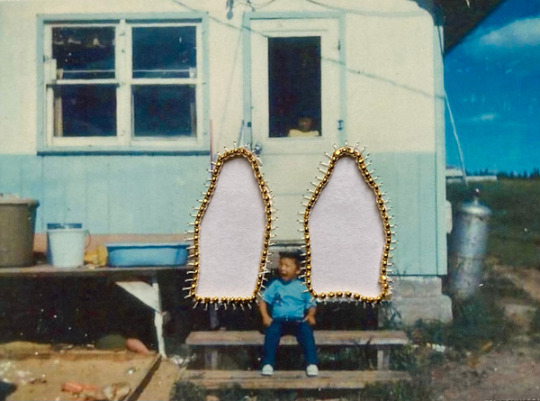
Catherine Blackburn | Scooped (detail). 2017
Catherine Blackburn was born in Patuanak Saskatchewan, of Dene and European ancestry and is a member of the English River First Nation. She is a multidisciplinary artist and jeweller, whose common themes address Canada's colonial past that are often prompted by personal narratives. Her work merges mixed media and fashion to create dialogue between historical art forms and new interpretations of them. Through utilizing beadwork and other historical adornment techniques, she creates space to explore Indigenous sovereignty, decolonization and representation.
#catherine blackburn#scooped#sixties scoop#60s scoop#millennial scoop#indigenous art#INDIGENOUS CONTEMPORARY ART#contemporary art#beading#photography#contemporary beading#indigenous beadwork#Contemporary Photography#indigenous photography#mixed media#indigenous mixed media#Dene artist#contemporary dene art#dene art
333 notes
·
View notes
Text
#REVIEW: Somewhere Beyond the Sea, by TJ Klune
I have to say that I kind of needed this book. I absolutely adored The House in the Cerulean Sea, TJ Klune’s first book in what we’re apparently calling the Cerulean Chronicles, and I’m really hoping that the fact that the series has a title now means we’re going to see more of it. My review of that first book has become one of my most inexplicably popular posts– my seventh most popular post in…

View On WordPress
#book reviews#canada#family#fantasy reviews#found family#government#LGBTQ#orphanages#parenting#reading#reviews#romance#sixties scoop#somewhere beyond the sea#the house in the cerulean sea#tj klune
3 notes
·
View notes
Text
one (fun?) fact about my family is that my uncle was part of the 60's scoop so he was an indigenous kid who got adopted into a white family by british parents. now the 60's scoop was horrifying (as is canada's history with indigenous people in general) but i would like to share some instances that the canadian government definitely didn't account for:
when my uncle was a baby my grandma (a white british lady) was walking him in a stroller when a stranger said "he looks just like you!" and my grandma's response was to say "thank you!" after a moment of confusion, since her baby was very clearly brown and shares no features with her.
our family is very supportive of him reconnecting with his roots but nobody knows who his birth family is. except for a random indigenous man he golfs with who clocked which family group he comes from because he's "short and stout".
i went with him to film a video about residential school survivors, but since i wasn't filming i basically just hung out at a museum all day with the people who weren't filming and got free lunch. he introduced me as his sister's kid and nobody said anything but i think it's funny to think about how i was this random white kid who was just there.
when he invited me to come film he said i wasn't white like the rest of my family. i know he meant that i would fit in with the group but it was very funny.
the canadian government made it basically impossible for him to get status and kept asking him to prove he was indigenous. he complained about this to us and someone suggested that he just show a family photo in which he is clearly an indigenous person surrounded by white people.
i'm the most left-wing of the family and very interested in politics, and he's very passionate about his culture and is a big figure in the indigenous art world here, so most family gatherings include me and him talking about racism and indigenous culture while our family desperately tries to get us to stop infodumping.
my family has also learned a lot about indigenous issues through osmosis and educating themselves, which means my indigenous ex-gf once had an in-depth conversation with my grandma about the 60's scoop and residential schools and they were very clearly shocked because my grandma does NOT seem like someone who is educated on it at first glance.
he doesn't burn in the sun so in all the family photos from childhood vacations he's the only one without a sunburn. every summer he is very proud of his watch tan.
sometimes he makes self-deprecating jokes at the expense of indigenous people at family gatherings and everybody kind of awkwardly has to decide whether or not to laugh while he cackles at his own joke.
he has said he wants to watch my sister's track practices but a) doesn't want to look like a creep and b) when someone inevitably asks who he's watching and he points at my sister they will be Concerned.
anyways @ the canadian government your plan failed and instead you got a bunch of educated white people and a man who is very good at and well known for making art inspired by his culture. now can you give him status or are you still too scared of paying him all the money he's owed?
#canada#canadian#sixties scoop#60's scoop#me coming home after learning about the 60's scoop in school: hey i have questions#my grandma: yeah we don't know why they call it the 60's scoop either since it went on way longer but we have bigger fish to fry#also my uncle is the only golfer in my family. you know the infamous white people sport?#apparently there's a whole group of indigenous guys who go golfing together here
3 notes
·
View notes
Text
So I'm only halfway through "Little Bird" and so I'm sure there will be many more instances of the Canadian government covering itself in infamy for its treatment of its indigenous citizens, but I have to admit that the thing a representative of the Canadian government has been shown to do so far that made me maddest is when at the custody hearing the social worker lady makes a comment about the children's father "not being in the picture any more" and then later in the episode it's revealed that this is because he's IN A FUCKING COMA due to getting the shit beaten out of him by the police (after he got angry at them for handcuffing his wife to a counter because she was distraught that the Canadian government essentially kidnapped three of their four children, let's not forget).
I also have noticed that the two times a representative of the Canadian government has given Bezhig/Esther useful information (the police officer giving her her sister's old address and the other social worker telling her the reservation she was from) it was made very clear that they were giving her information that She Was Not Supposed To Know. This is not a show that covers any aspect of the government of Canada in glory.
4 notes
·
View notes
Text
#Birth alert#foster care#foster kids#intergenerational trauma#Intergenerational foster care#Sixties Scoop#Indigenous Canada#Indigenous peoples of Canada#Native#Children's Aid Society#Indigenous children
3 notes
·
View notes
Text
Learning about Canada while growing up in white leftist circles in America is Wild because it gets framed as this promised land of free healthcare and reasonable politicians, you've got people making jokes about evacuating to Canada when trump was elected and the handmaid's tale portraying it as this almighty place of refuge...
...then you start learning about the meaning behind Orange Shirt Day and the Sixties Scoop and residential school denialism and MAID and I will never, ever say that the us is above any of that and worse, but how the hell did Canada get the reputation of being better?
#rambling sorry#just learning about the sixties scoop and it makes me want to throw up#don't know the extent in america because most of what I found was from canada#but fucking fuck IT WAS FULLY BLOWN CHILD TRAFFICKING#coming on the heels of residential schools#just give the kid to any random piece of shit as long they're white...this is absolutely disgusting#and that's on top of MAID and all the bad ways Canada's free healthcare can go#I don't know if residential school denialism is a thing in America but Canada apparently has a problem with#these wastes of space denying mass child abduction/torture/murder so good to fucking know#canada#canadian history#sixties scoop#residential schools#tw child theft#child theft#kidnapping mention#racism#colonization#colonialism#indigenous history#disability#ableism#anti colonialism#anyway I'm sorry to my Canada followers it's not your fault your country was/is a shit show#and it makes no sense because they ADMIT IT!!! A lot!!!#and people still thinking they're better!#trafficking mention
1 note
·
View note
Text
They did the same here in Canada. One of my cousins was stolen from his birth parents and put up for adoption. The government falsified documents about his origins. My aunt and uncle were told he was Italian.
that report on Zionists abducting blonde Palestinian children to be "adopted" by Zionists makes me physically shake. I'm an Aboriginal person with extended family who were abducted by the "Australian" government decades ago and put up for "adoption" by whites as part of what is now known as the Stolen Generations. All Aboriginal children, but especially those who were lighter in features, were the target of this genocidal assimilation policy. The colonial legacy of Aboriginal child abduction on my peoples is an intergenerational abyss of cultural loss, the destruction of bloodlines, despair and grief that is still felt by every First Nations person in the country today. To be alive and witness another Indigenous people experience the same destruction by practically the same hand drowns me in anguish. Fuck settler colonial projects. Death to all of them. They're all the fucking same. Land Back for every First Nations peoples living under occupation, from Palestine to so-called Australia.
11K notes
·
View notes
Photo
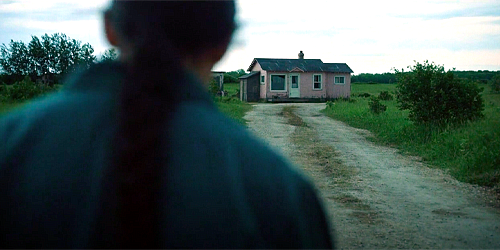

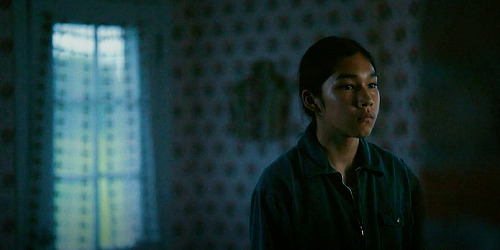
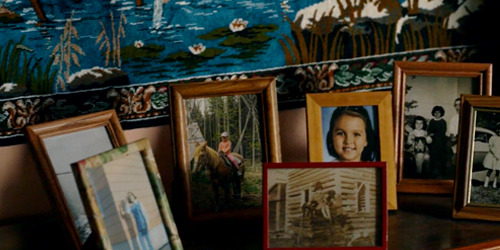


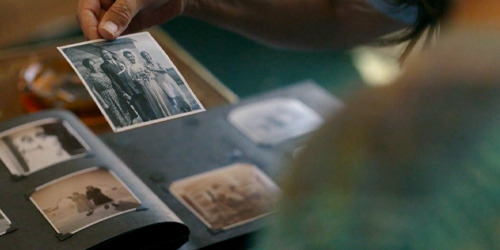
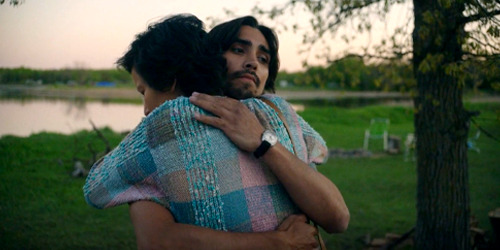

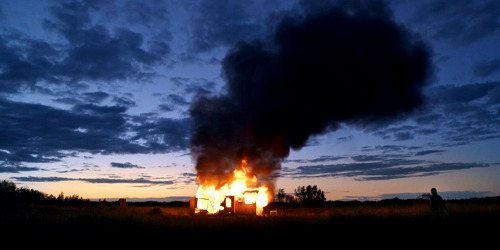
This is my mother and that's my father. You were wrong. They wanted me. No. That's not-. It's what I found out. You were not taken care of. This is what they told, "Save these children. They need good homes. It's a mitzvah." You're not listening. That's my mother and father and they loved me. No. I was removed because the Government was taking Indian kids. We had a paper saying "unfit mother". You don't think Governments have lied before? [...] You can't just stick a new name on a person and pretend that nothing's happened. And you can't just take a five year old child away from their family and think that they're just gonna forget.
LITTLE BIRD (2023) | Episode Four directed by Elle-Máijá Tailfeathers
#little bird#little bird crave#little bird aptn lumi#littlebirdedit#canadian cinema#canadiantv#dailyworldcinema#perioddramasource#perioddramaedit#userperiodrama#tvedit#televisiongifs#cinematv#darla contois#lisa edelstein#braeden clarke#tayton mianskum#michelle thrush#tw sixties scoop#eric schweig#mine*
61 notes
·
View notes
Text
saw a reddit thread hating on a tj klune book and it rly felt like wow it's my time to shine!!!!!!!!
#'aw but his books are so cozy' yeah he thinks the fucking sixties scoop is cozy#and that's the start of his issues lmao
4 notes
·
View notes
Text
every once in awhile i remember that the house in the cerulean sea was based off the sixties scoop and i go incandescent with rage.
#oh you're gonna use a genocide as part of your lil all white queer happy found family fantasy? i hope you die actually tj#genuinely hate that man and hate that so many people recommend him. noxious obnoxious annoying ass#anyways. i'm doing readalikes for the berry pickers and taht came up and i almost fell outo f my chair#NO I'M NOT PUTTING THAT ASSHOLE'S URBAN FANTASY TAKE ON THE FUCKIGN SIXTIES SCOOP ON THIS READALIKE THANKS#librarian tag
2 notes
·
View notes
Text
"Kill the savage. Save the man."
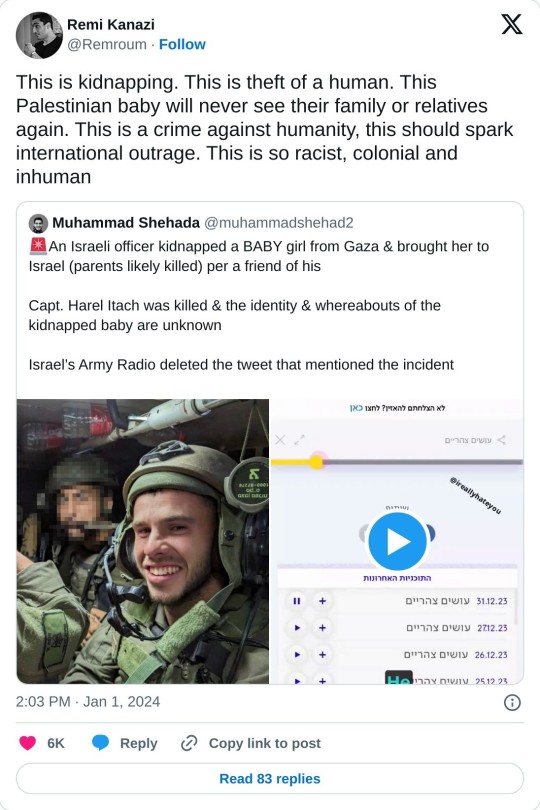

This is human trafficking
#reblog#Free Palestine#Gaza#babies#kidnapping#Israel#Yediot#Army Radio#Twitter#human trafficking#indegenous people#Canada#Sixties Scoop#colonizers
31K notes
·
View notes
Note
maddie, sorry to ruin christmas, but i just learned that TJ Klune is released a sequel for The House on the Cerulean Sea and i don't know what possessed him to do that
NO MY GOD WHYYYYYYYYYYY 😭😭😭
i cant think of a book that needs a sequel less than that book does like what do you MEAN……..oh. oh this truly sucks man wtf
#countless books on planet earth. thousands of authors more skilled in their craft but yeah no let’s give a sequel to the person who used th#sixties scoop as ~inspiration~ for his dumbass book 😒 like actually why don’t go live off im the forest and never write again.#✉️#gyuseulogy#kpop
3 notes
·
View notes
Text
[article about woman having her baby taken away from her by forcible c-section]
Reactionary Clowns: "Clearly, this is because of government healthcare".
#catgirltxt#i guarantee you this kind of shit happens in the states too#also most of the sixties scoop happened pre-universal healthcare#fucking clowns
5 notes
·
View notes
Text
Sometimes I think a lot about my mom's cat
My mom's cat is a common domestic shorthair we found on the side of the road as a kitten
Regular cat, not a maine coon or one of those massive breeds. His mom was smaller than a loaf of bread
But in a sort of a Clifford The Big Red Dog situation, he grew super fast, and really really big, and took a super long time to stop growing
Worried that she was overfeeding him, she eased back his portions, but he stayed a massive round baby
When he started having kidney problems, she took him to the vet.
The vet took a look at him and said, "holy fuck, what are you feeding him", checked the nutritional listings on his chow, and told her "Yeah, maybe he's reacting badly to the amount of grain in this, try a meatier diet"
So my mom wound up special-ordering this specific high-protein prescription cat food made of like. Kangaroo meat or some shit that cost like sixty bucks a bag
And, as typical act two in an episode of House, he somehow got worse on the fancy specialized stuff that was supposed to be Primo Athlete Olympic Feline Blend
Like. WAY worse. His guts were inflamed and his kidneys were shutting down and he was all sore and HE WAS STILL HUGE, just miserable and sad
So shetook him back to the vet, where they had to help him pee (he was apparently close to bursting and had some kind of blockage too) and went "Yeah no this is NOT normal and we don't know what's going on, we're gonna do some tests but in the meantime you should go back to what he was eating before, at least that wasn't actively killing him" so she did
And he still wasn't great, but he also improved
And so they take his blood and do an ultrasound and a couple g's later she gets a call back like "this is gonna sound crazy, but we want you to put him on a low-meat diet. Just the least amount of protein and iron and shit. We need you to find the grainiest, filler-iest dollar tree kibble available and give him some of that bad bad shit"
And my mother is a woman of science. So she did
And he GOT BETTER
His energy picked back up, inflammation went down, he started drinking normally again, got back to pissing like a fuckin champion
And so it turns out that out of all the random ass freeway bonus cats we possibly could have scooped out of a ditch, WE got the one-in-a-million freak of nature with a SPECIFIC genetic defect that means a paleo protein free range diet is essentially poison and he THRIVES on cheap ass garbage
Like. He medically NEEDS junk food
I dont really understand how that works, but i cant argue with results.
If we had four of him, they'd outweigh my mom. And he's FINE
Also blind, but that's unrelated
Im not using him as a symbol or a metaphor or anything. I just keep catching myself thinking about my mom's Big Fucking Cat
#I'm sorry#I feel like this is supposed to be some kind of message from the universe#Like maybe I'm the cat and the garbage food is. Something#But nope he just lives in my head rent free#The biggest fucking boy
28K notes
·
View notes